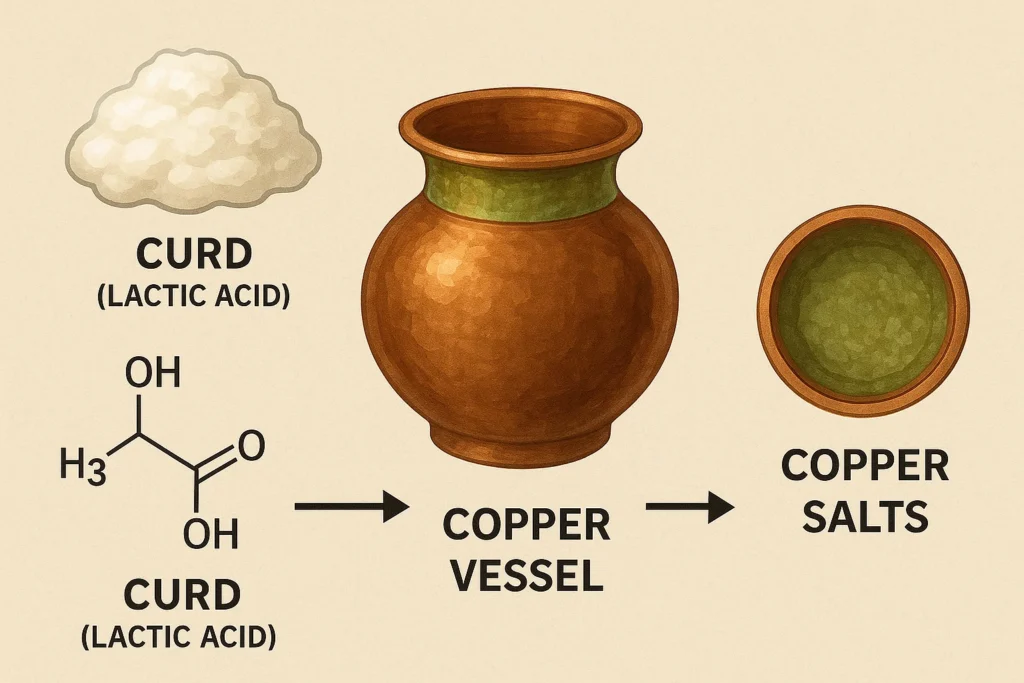Table of Contents
From ancient kitchens to modern households, brass and copper utensils have been a part of our culinary culture. They are valued for their beauty, durability, and even health benefits. However, despite their traditional usage, there’s a scientifically proven reason why curd and sour substances should not be kept in brass and copper vessels.
Why Should Curd and Sour Substances Not Be Kept in Brass and Copper Vessels?
In this blog, we will explore the chemical reasons, health effects, and safe practices when it comes to storing acidic foods like curd, lemon juice, or tamarind in metal containers. Whether you’re a homemaker, health enthusiast, or student, understanding the interaction between acidic substances and reactive metals is essential.

The Science Behind What Happens When Acidic Foods Are Stored in Copper or Brass
Brass is an alloy made of copper and zinc, while copper is a pure metal. Both are reactive metals. When sour substances such as curd, lemon juice, vinegar, or tamarind come into contact with these vessels, a chemical reaction takes place.
This reaction can be summarized as:
Acids (from food) + Copper/Brass = Metal salts + Gas (sometimes)

The acid in these foods leaches copper ions or zinc ions from the vessel’s surface, resulting in the formation of toxic metal salts.
Health Hazards of Using Copper and Brass for Sour Foods
1. Formation of Toxic Compounds
- When curd or any fermented or sour food is stored in copper or brass vessels, they react to form:
- Copper sulfate
- Zinc acetate (from brass)
- These compounds are not meant for ingestion and are toxic to the human body.
2. Symptoms of Metal Poisoning
Consuming food contaminated with these metal salts can lead to:
- Nausea
- Vomiting
- Stomach cramps
- Metal taste in the mouth
- In extreme cases: liver and kidney damage
3. Disruption of Nutrient Absorption
Copper ions in excess can interfere with the absorption of iron and zinc, leading to nutritional deficiencies over time.
Why Are Sour Substances More Reactive?
Sour foods contain organic acids such as:
- Lactic acid (in curd)
- Citric acid (in lemons)
- Tartaric acid (in tamarind)
- Acetic acid (in vinegar)
These acids:
- Have low pH (are highly reactive)
- Break down the protective oxide layer of copper and brass
- Facilitate corrosion and metal ion release
Historical Context vs Modern Science
Traditionally, brass and copper vessels were used with a tin lining (kalai) to prevent direct contact with acidic foods. Over time, if the lining wears off or isn’t reapplied, the vessel becomes unsafe.
Common Mistake:
Many households use copper utensils for curd storage believing in traditional wisdom, without realizing the need for proper lining.
Safe Alternatives for Storing Sour Foods
If you’re wondering what to use instead of copper or brass, Best Materials for Storing Curd and Sour Substances
| Material | Reason |
|---|---|
| Stainless Steel | Non-reactive, durable, widely available |
| Glass | Completely inert and doesn’t leach |
| Ceramic/Clay | Traditional and chemical-free |
| Food-grade Plastic | Lightweight, but only safe for short-term use |

Preventing Metal Reactions in the Kitchen
To keep your kitchen safe and toxin-free:
- Use copper and brass only for water or dry food items.
- Do not store fermented or acidic foods in reactive metal containers.
- Get your utensils tinned (kalai) regularly if you wish to continue using them.
- Read labels when buying utensils to ensure they’re food-safe.
Comparing Common Utensil Materials
| Material | Reactivity with Acids | Suitable for Sour Foods? |
|---|---|---|
| Copper | High | No |
| Brass | High | No |
| Stainless Steel | Very Low | Yes |
| Aluminum | Moderate | No (forms aluminum salts) |
| Glass | None | Yes |
Case Example: Curd in Copper Pot
Let’s say you stored curd in a copper pot for 5 hours:
- Curd (contains lactic acid) reacts with copper.
- Copper lactate forms, a toxic compound.
- Upon consumption, it can cause digestive issues.
- The pot may also turn greenish due to corrosion.
This illustrates why curd should never be stored in copper vessels, even for a short duration.
FAQs: Curd, Sour Foods, and Metal Vessels
Can I use copper for drinking water?
Yes, but only after storing water for 6-8 hours. This is a traditional Ayurvedic practice known as Tamra Jal, which offers benefits when copper is not consumed in excess.
Is storing curd in stainless steel safe?
Absolutely. Stainless steel is non-reactive, making it ideal for curd, lemon juice, and other acidic foods.
What is Kalai in traditional vessels?
Kalai is a tin coating applied inside brass or copper utensils to make them safe for cooking or storing sour items. Over time, this layer wears off and needs reapplication.
What if I accidentally ate food stored in copper?
If it was for a short duration, it may not cause harm. However, observe for symptoms like nausea, metallic taste, or upset stomach. In case of discomfort, consult a doctor.
Are decorative copper vessels safe?
No, most decorative pieces are not food-grade. They are often coated with chemicals or paints that can leach into food.
Key Takeaways
- Do not store curd, vinegar, lemon, or any sour substance in copper or brass.
- The acidity reacts with metals, forming toxic salts that can harm your health.
- Traditional utensils are safe only if they’re properly coated or lined.
- Use stainless steel, glass, or ceramic for sour and fermented food storage.
Conclusion
Brass and copper vessels have their place in our kitchens, but only when used correctly. While they offer health benefits when used with water or dry food, they should not be used to store curd or any sour substance. The acidic content reacts with the metal, leading to the formation of harmful compounds.
Staying informed about the right materials for food storage ensures better health, longer-lasting utensils, and safe meals for your family.